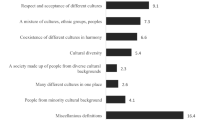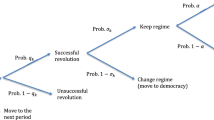Abstract
Many observers of minority issues in the Netherlands picture its present social and political climate as a radical departure from a multicultural past. However, the idea of a break with multiculturalism, and the deterioration of tolerance and ethnic harmony that is often attributed to this break, is deceptive. First, Dutch ‘multiculturalism’ was never more than ethnic targeting in redistributive policies. It served efficiency rather than the philosophy of equal recognition as justice, the core of multiculturalism. Second, ethnic targeting in policymaking continues. There is a break with the past in the sense that targeted policies increasingly serve assimilation and repression rather than redistribution, but there is continuity in the sense that the refined classification machinery that was made to facilitate ethnic targeting is deeply institutionalized in politics, bureaucracy and in society at large. The overall conclusion in this article is that builders of ethnic classification systems, however benign their purpose, should be careful what they wish for – political climates change faster than systems of population classification.
Similar content being viewed by others
Notes
05TheHaque2599, The Dutch Muslim community: A primer. www.orianomattei.blogspot.com, accessed 26 January 2011.
To illustrate: in countries around the world affirmative action originates as a device to pacify immediate conflict. See Sabbagh (2011b, pp. 111–113) for a comparative summary of this point. See also Jencks (1992, pp. 58–67), Sabbagh (2003, pp. 30–59) and Skrentny (1996, pp. 111–144) on the introduction of affirmative action in the United States; Martin (2001) on the Soviet Affirmative Action Empire; De Zwart (2000, pp. 243–244) on British India and Sowell (1990) on Malaysia.
Note that ‘race’ in Dutch legal usage includes ethnic minorities.
Journalists follow another code of ethics: they argue that the public's right to be informed about violence and crime outweighs the risk of stigmatization and stereotyping of the groups to which perpetrators belong.
Lenz was not Nazi but a ‘true bureaucrat’. The new identity system was his life accomplishment in the service of efficient policymaking. He published a 400 page book about its making in 1941.
References
Andriessen, I., Dagevos, J., Nievers, E. and Boog, I. (2007) Discriminatiemonitor niet-westerse allochtonen op de arbeidsmarkt 2007. Den Haag/Rotterdam, the Netherlands: Sociaal en Cultureel Planbureau/Art.1.
Amnesty International (the Netherlands). (2007) Aanpak van discriminatie door Nederlandse gemeenten: 443 kansen voor verbetering. Amsterdam, the Netherlands: Amnesty International.
Bailey, S.R. (2009) Legacies of Race: Identities, Attitudes, and Politics in Brazil. Stanford, CA: Stanford University Press.
Binnenlands Bestuur. (2008) Doelgroepenbeleid terug van weggeweest, http://www.binnenlandsbestuur.nl/nieuws/2008/12/doelgroepenbeleid-terug-van-weggeweest.102034.lynkx, accessed 3 March 2009.
Bureau Discriminatiezaken (Hollands Midden en Haaglanden). (2009) Factsheet. Helderheid voor voorkeursbeleid 4.
CBS (Centraal Bureau voor de Statistiek). (2008) Jaarrapport Integratie. Den Haag, the Netherlands: CBS.
Cramer, M. (2005) Volkstelling: Nieuwe en interessante bestanden bij het CBS. Stator 6 (4): 25–29.
De Telegraaf. (2007) Stop ongeremoe stroom integratiesubsidie, 6 November.
De Zwart, F. (2005) The dilemma of recognition: Administrative categories and ethnic diversity. Theory and Society 34 (2): 137–169.
De Zwart, F. (2000) The logic of affirmative action: Caste, class and quotas in India. Acta Sociologica 43 (3): 235–251.
De Zwart, F. and Poppelaars, C. (2007) Redistribution and ethnic diversity in the Netherlands: Accommodation, denial, and replacement. Acta Sociologica 50 (4): 387–399.
De Volkskrant. (2011) Toestand Turks-Nederlandse jongeren zeer zorgwekkend. 10 January.
DPA (College Bescherming Persoonsgegevens). (2010) Onderzoek Deelgemeente Charlois, Z2009-00449: 1–13.
Duyvendak, J.W. and Scholten, P. (2010) The invention of the Dutch multicultural model and its effects on integration discourses in the Netherlands. Perspectives on Europe 40 (2): 39–49.
Erk, J. (2011) The famous Dutch (in) tolerance. Current History 110 (734): 110–116.
Entzinger, H. (1984) Het minderhedenbeleid. Dilemma's voor de overheid en zes andere immigratielanden in Europa. Meppel/Amsterdam, the Netherlands: Boom.
Entzinger, H. (2003) The rise and fall of multiculturalism: The case of the Netherlands. In: C. Joppke and E. Morawska (eds.) Toward Assimilation and Citizenship: Immigrants in Liberal Nation-States. Hampshire, UK: Palgrave, pp. 59–86.
Entzinger, H. and Dourleijn, E. (2008) De lat steeds hoger: de leefwereld van jongeren in een multi-etnische stad. Assen, the Netherlands: Van Gorcum.
European Commission against Racism and Intolerance (ECRI). (2007) Third Report about the Netherlands. Strasbourg, France: Council of Europe.
Fraser, N. and Honneth, A. (2003) Redistribution or Recognition? A Political-Philosophical Exchange. London/New York: Verso.
Harchaouidi, S. (2008) Interview by Dennis Mensink. Spits 27 October.
Herman, V. and van der Laan Bouma, R. (1980) Nationalists without a nation: South Moluccan terrorism in the Netherlands. Terrorism 4 (1): 223–257.
Hermans, P. (2004) Contra-narratieven van Marokkaanse ouders: Een weerwoord op discriminatie, paternalisme en stigmatisering. Migrantenstudies 20 (1): 36–53.
Human Rights Watch. (2008) The Netherlands: Discrimination in the Name of Integration. Migrants’ Rights Under the Integration Abroad Act, http://www.hrw.org/Reports/2009/04/13/Netherlands-discrimination-name-integration, accessed 26 April 2012.
Intelligence Group. (2008) Allochtoon ergert zich aan allochtoon, www.intelligence-group.nl/bijblijven/nieuws/?newspath, accessed 20 June 2010.
Jencks, C. (1992) Rethinking Social Policy: Race Poverty and the Underclass. New York: Harper Perennial.
Jeffers, C. (1967) Living Poor: A Participant Observer Study of Choices and Priorities. Ann Arbor, MI: Ann Arbor Publishers.
Joppke, C. (2004) The retreat of multiculturalism in the liberal state: Theory and policy. The British Journal of Sociology 55 (2): 237–257.
Joppke, C. (2010) Minority rights for immigrants? Multiculturalism versus antidiscrimination. Israel Law Review 43 (49): 50–66.
Kennedy, R.L. (1989) Racial critiques of legal academia. Harvard Law Review 102: 1745–1819.
Kertzer, D.I. and Arel, D. (2006) Population composition as an object of political struggle. In: R.E. Goodin and C. Tilly (eds.) The Oxford Handbook of Contextual Political Analysis. Oxford: Oxford University Press, pp. 664–677.
Kamerstukken (the Official Parliament Archive). (2002) TK 2001–2002, 29198, no. 2. Den Haag.
Koopmans, R. (2010) Trade-offs between equality and difference: Immigrant integration, multiculturalism and the welfare state in cross-national perspective. Journal of Ethnic and Migration Studies 36 (1): 1–26.
Koser Kaya, F. (2011) Jonge Turken zijn een gat in de markt. NRC Handelsblad 8 January.
Kymlica, W. (1995) Multicultural Citizenship: A Liberal Theory of Minority Rights. Oxford: Oxford University Press.
Kymlica, W. (2005) Liberal multiculturalism: Western models, global trends, and Asian debates. In: W. Kymlica and B. He (eds.) Multiculturalism in Asia. Oxford: Oxford University Press, pp. 22–55.
Lindblom, C.E. (1959) The science of ‘muddling through’. Public Administration Review 19 (2): 79–88.
Looman, C. (2008) Diversiteit en grotestedenbeleid in twee Nederlandse steden. MA-thesis, Faculty of Social Sciences, Leiden University.
Martin, T. (2001) The Affirmative Action Empire: Nations and Nationalism in the Soviet Union, 1923–1939. Ithaca and London: Cornell University Press.
Miller, P. (2001) Governing by numbers: Why calculative practices matter. Social Research 68 (2): 379–396.
Ministerie BZK. (2011) Integratienota: Integratie, Binding, Burgerschap. Den Haag, the Netherlands: Ministerie van Binnenlandse Zaken.
Nobles, M. (2000) Shades of Citizenship: Race and the Census in Modern Politics. Stanford, CA: Stanford University Press.
Parekh, B. (2000) Rethinking Multiculturalism: Cultural Diversity and Political Theory. Basingstoke, UK: Palgrave, Macmillan Press.
Parliamentary Papers. (1977–1978) De problematiek van de Molukse minderheid in Nederland, (1495, 2) The Hague, the Netherlands: Government Press.
Philips, A. (2007) Multiculturalism without Culture. Princeton, NJ: Princeton University Press.
Polletta, F. and Jasper, J.M. (2001) Collective identity and social movements. Annual Review of Sociology 27: 283–305.
Poppelaars, C. and Scholten, P. (2008) Two worlds apart: The divergence of national and local immigrant integration policies in the Netherlands. Administration & Society 40 (4): 335–357.
Prewitt, K. (2010) When social inequality maps to demographic diversity, what then for liberal democracies? Social Research 77 (1): 1–20.
Rogers-Dillon, D. (1995) The dynamics of welfare stigma. Qualitative Sociology 18 (4): 439–456.
Sabbagh, D. (2003) L’Egalité par le Droit: les paradoxes de la discrimination positive aux Etats-Unis. Paris, France: Economica.
Sabbagh, D. (2011a) The rise of indirect affirmative action: Converging strategies for promoting ‘diversity’ in selective institutions of higher education in the United States and France. World Politics 63 (3): 470–508.
Sabbagh, D. (2011b) Affirmative action: The US experience in comparative perspective. Daedalus 140 (2): 109–120.
Scott, J.C. (1998) Seeing Like a State: How Certain Schemes to Improve the Human Condition have Failed. New Haven en London: Yale University Press.
Selznick, P. (1957) Leadership in Administration: A Sociological Interpretation. Berkeley/Los Angeles, CA: University of California Press.
Sen, A. (1995) The political economy of targeting. In: D. van der Walle and K. Nead (eds.) Public Spending and the Poor: Theory and Evidence. Baltimore and London: John Hopkins University Press, pp. 11–24.
Skerry, P. (2000) Counting on the Census? Race, Group Identity, and the Evasion of Politics. Washington DC: Brookings Institution.
Skrentny, J.D. (1996) The Ironies of Affirmative Action: Politics, Culture, and Justice in America. Chicago, IL: The University of Chicago Press.
Sniderman, P.M. and Hagendoorn, L. (2007) When Ways of Life Collide. Princeton and Oxford: Princeton University Press.
Sowell, T. (1990) Preferential Policies: An International Perspective. New York: William Morrow and Company.
Tajfel, H. (1981) Human Groups and Social Categories. Cambridge, UK: Cambridge University Press.
Taylor, C. (1994) The politics of recognition. In: A. Gutmann (ed.) Multiculturalism: Examining the Politics of Recognition. Princeton, NJ: Princeton University Press.
The Dutch Data Protection Authority (DPA). (2010) Rapport April 2010. Z2009-00449.
Tilly, C. (1998) Durable Inequality. Berkeley, Los Angeles, London: University of California Press.
Vasta, E. (2007) From ethnic minorities to ethnic majority policy: Multiculturalism and the shift to assimilationism in the Netherlands. Ethnic and Racial Studies 30 (5): 713–740.
Wiegel, H. (1978) De problematiek van de Molukse minderheid in Nederland. The Hague, the Netherlands: Government of the Netherlands.
Wilson, W.J. (1987) The Truly Disadvantaged: The Inner City, the Underclass, and Public Policy. Chicago, IL: University of Chicago Press.
WRR (Wetenschappelijke Raad voor het Regeringsbeleid). (2007) Identificatie met Nederland. Amsterdam, the Netherlands: Amsterdam University Press.
Acknowledgements
I thank Odile Verhaar, Daniel Sabbagh, Rod Aya, Bas van Gool and anonymous reviewer for their constructive and helpful comments.
Author information
Authors and Affiliations
Rights and permissions
About this article
Cite this article
De Zwart, F. Pitfalls of top-down identity designation: Ethno-statistics in the Netherlands. Comp Eur Polit 10, 301–318 (2012). https://doi.org/10.1057/cep.2012.8
Published:
Issue Date:
DOI: https://doi.org/10.1057/cep.2012.8




